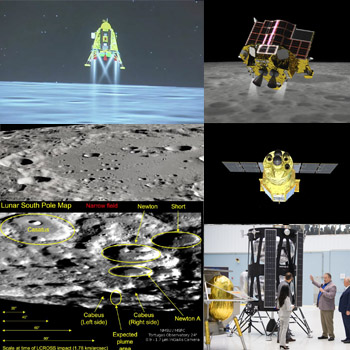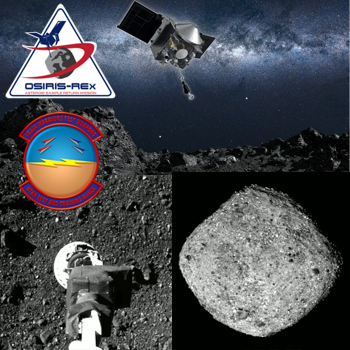Unprecedented Lunar Landings: India Explores South Pole, Japan Prepares to Follow, USA Not Far Behind
In a historic moment for India, the country is the first to land spacecraft in the Moon south pole region. The exploratory mission of Chandrayaan-3 is expected to last at least two Earth weeks / one lunar day as ISRO next major focus is crewed space missions. August 27, JAXA is set to launch Smart Lander for Investigating Moon (SLIM) with Lunar Excursion Vehicle 2 rover, and X-ray Imaging and Spectroscopy Mission (XRISM) to collect data on black holes, clusters of galaxies and formation of the universe. With a launch mass of about 700 kg, SLIM is planned to land in a small crater in Mare Nectaris on the near side equatorial region in 4-6 months. SLIM will aim to achieve 100-m landing accuracy to a site ~500 meters east of Shioli crater (13.33°S, 25.23°E), and spend at least one lunar day operating on the lunar surface. Intuitive Machines is preparing for November 15 launch of its Nova-C lander – possibly becoming the first USA spacecraft to return the Moon and first to launch for Commercial Lunar Payloads Service (CLPS). Other CLPS landers include Astrobotic Peregrine (NET Q4 2023) and Firefly Blue Ghost (NET 2024). The US$2.6 billion CLPS program is to run through November 2028. International lunar orbiters may attempt to image Roscosmos Luna-25 lunar impact site. Head of Roscosmos, Yuri Borisov, maintains the Russian space program will remain Moon-focused and accelerate work on Luna-26, -27 and -28. (Image Credits: NASA, ISRO, Hindustan Times)
|
MONDAY☆ Aug 28 — International Space Station, ~415-km LEO: Expedition 69 with newly arrived Crew 7 to remain 10-member crew until Friday return to Earth of 4-person Crew 6 mission; working with cargo from Progress 84P & 85P, Cygnus NG-19. ☆ Aug 28 — Tiangong Space Station, ~390-km LEO: Shenzhou 16 three-member crew continue setting up modules for upcoming international experiments; China Academy of Space Technology engineers produce detailed design overview of TSS. Highlights… o NewSpace: Space Perspective manufacturing carbon-neutral Spaceship Neptune to carry 8 passengers on 6-hour space tour in 2024; Axiom Space to advance private spaceflight, commercial space station, spacesuits with US$350M funding from Saudi and S Korean investors; SpaceX prototype Booster 9 on test pad for 2nd static fire attempt of 33 Raptor engines. ☆ Solar System: Trajectories of 37 boulders measuring < 6.7 m ejected from Dimorphos by DART impactor being tracked with Hubble; Mars colony could be viable with as few as 22 inhabitants, agreeable personality types would thrive suggests GMU study; Lunar-penetrating radar on Chang’E-4 rover Yutu-2 continuing to characterize regolith up to 300-meter depth. ☆ Galaxy: Astronomers at JAXA Usuda Deep Space Center await return message from Altair, a star 16.7 ly distant, target of METI in 1983; new study of Trappist-1 exoplanets shows some of the 7 worlds may be habitable; Univ of Cambridge astronomers posit Andromeda research may contribute to knowledge of dark energy. o Global: ESA-sponsored Clearspace-1 mission to deorbit 113-kg VESPA adapter recalibrating after apparent in-space collision; Peruvian Space Agency considering spaceport build-out with support from US Space Command near Paita (5.1°S); N Korea National Aerospace Development Administration to make 3rd attempt to launch Malligyong surveillance satellite in Oct following 2nd failure. ● USA: NASA team integrating 453.5-kg wiring harness into Nancy Grace Roman Space Telescope at GSFC; Carbon Mapper on ISS monitoring emissions from Blue Origin test facility in TX after recording 1,500 kg / hr methane plume; Lockheed Martin and Northrop Grumman to build 72 comm satellites for Space Development Agency under $1.5B contract. ● Hawai’i: National Astronomical Observatory of Japan, operator of Subaru Telescope on Mauna Kea, to raise donations for and contribute to volunteerism on Maui; International Lunar Observatory Association of Hawaii sending ILO-X instrument suite including Ka ‘Imi imager to launch on Falcon 9 / Nova-C NET Nov 15; Gemini South observing dying red-giant star in Toby Jug Nebula in the constellation Carina. |
 |
● = Terrestrial and… o = International terrestrial events
☾ = Moon activity ★ = Space and… ☆ = International space / astro events in Hawaii Standard Time unless noted. Add 10 hours to obtain UT (‘Universal Time’). |
Weekly Planet Watch – Evening Planets: Saturn (ESE), Uranus (E), Neptune (E); Morning Planets: Venus (E), Jupiter (S).
Preparations Underway for Arrival of First USA Asteroid Sample Return OSIRIS-REx and Future Missions
Landing within 6,930-km2 Utah Test and Training Range (UTTR) NET Sept 24, OSIRIS-REx (Origins, Spectral Interpretation, Resource Identification, Security, Regolith Explorer) return capsule is estimated to contain at least 59.5 grams of material dislodged from asteroid 101955 Bennu, with up to 2,000 grams possible. NASA has a slate of media events scheduled to celebrate and publicize the expected historic achievement: a pre-landing news conference will be held Aug 30 at US Army Dugway Proving Ground, ~21 km south of UTTR, 9-minute remote interviews of mission team members will be conducted via Zoom while USPS is holding a ceremony for first issuance of OSIRIS-Rex stamp at Clark Planetarium in Salt Lake City on Sept 22. The sample capsule landing itself will be broadcast on NASA TV, app and website beginning 08:00 MDT (14:00 UTC), followed by a sample reveal event at JSC Oct 11. OSIRIS-Rex is managed by NASA GSFC and built / operated by Lockheed Martin, while science operations including team members from USA, Canada, France, Italy, Germany and UK are overseen by University of Arizona Lunar and Planetary Laboratory. Canada collaboration is particularly prominent in the mission, with OSIRIS-REx Laser Altimeter (OLA) contributed by MDA of Ontario. Other upcoming asteroid missions include NASA Psyche to 16 Psyche (NET Oct 5), JAXA DESTINY+ to 3200 Phaethon (NET 2024) and CNSA Tianwen-2 to 469219 Kamoʻoalewa (NET 2025). (Image Credits: NASA GSFC, University of Arizona, US Army) |
o Aug 28 – Sep 1 — Aix-Marseille University, Marseille Astrophysics Laboratory, CNES, ESA, et al, Marseille, France: 20th International Planetary Probe Workshop (IPPW 2023). Ongoing… o Aug 26 – Sep 1 — Stardust Alliance, Timmins, Ontario, Canada: 2023 Stardust Festival; connecting indigenous communities and aerospace-focused STEM. TUESDAY★ Aug 29 — United Launch Alliance, Launch Atlas V 551 / NROL-107 (Silent Barker), SLC-41, Cape Canaveral SFS FL: ULA to launch Atlas V 551 with NRO classified space situational awareness payload. ● Aug 29 — ExecutiveBiz Space, Falls Church VA: Space Technologies Forum; Cutting-edge technologies behind rapid progress in space. ● Aug 29-30 — NASA Advisory Council Science Committee, Washington DC: Meeting of the Science Committee of the NASA Advisory Council. ☆ Aug 29 — Apollo Asteroid 2023 QK5: Near-Earth Flyby (0.010 AU). ☆ Aug 29 — Atetn Asteroid 2023 QD2: Near-Earth Flyby (0.008 AU). WEDNESDAY☆ Aug 30 — International Space Station, SpaceX Crew-6 Undocking, ~415-km LEO: SpaceX Crew-6 Dragon craft and Stephen Bowen, Warren Hoburg, Sultan Al Neyadi and Andrey Fedyaev return to Earth after 180-day mission; undocking live coverage available. ★ Aug 30 — SpaceX, Launch Falcon 9 / SDA Tranche 0B, SLC-4E, Vandenberg SFB CA: Launch of demonstration satellites for U.S. military Space Development Agency. ★ Aug 30 — Van Allen Probes, LEO: Spacecraft reach 11 full years / begin 12th year in space today, launched 2012; adding to the understanding of Earth radiation belt environment and its variability. o Aug 30 — NASA, Online: Pre-landing news conference for OSIRIS-REx capsule / asteroid Bennu sample return. ☆ Aug 30 — Moon: At perigee (distance 357,176 km), 05:60; 2.32° SE of Saturn, 11:00; Full Super Blue Moon, 15:36. ☆ Aug 30 — Aten Asteroid 2012 PZ17: Near-Earth Flyby (0.043 AU). |
THURSDAY
● Aug 31 — AIAA, Online / Reston VA: Webinar: TRIDENT Ice Mining on the Moon with NASA’s PRIME-1 and VIPER; 16:00 EDT.
☆ Aug 31 — Moon: 1.28° SE of Neptune, 23:00.
☆ Aug 31 — Apollo Asteroid 2023 QH: Near-Earth Flyby (0.030 AU).
FRIDAY
● Sep 1-4 — KLOUDbusters, Argonia KS: AIRFest 29; launch of high-power rockets throughout 4 days.
☆ Sep 1 — Apollo Asteroid 2023 QB2: Near-Earth Flyby (0.020 AU).
☆ Sep 1 — Apollo Asteroid 2023 QZ1: Near-Earth Flyby (0.046 AU).
☆ Sep 1 — Aten Asteroid 2023 QU: Near-Earth Flyby (0.034 AU).
SATURDAY
☆ Sep 2 — ISRO, Launch PSLV-XL / Aditya L1, Satish Dhawan Space Center, India: First India heliophysics space observatory to operate from L1 Lagrange point ~1,500,000 km from Earth.
o Sep 2 — NOIRLab, Cerro Tololo, Chile: Public Tour of Cerro Tololo Inter-American Observatory Summit.
☆ Sep 2 — Apollo Asteroid 2017 BY32: Near-Earth Flyby (0.034 AU).
SUNDAY
☆ Sep 3 — Apollo Asteroid 2023 QG: Near-Earth Flyby (0.029 AU).
☆ Sep 3 — Aten Asteroid 2023 QH1: Near-Earth Flyby (0.033 AU).

